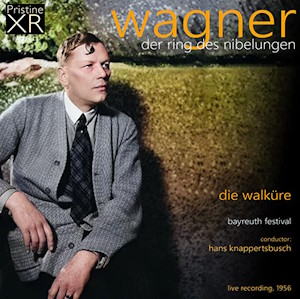
Richard Wagner (1813-1883)
Die Walküre
Siegmund – Wolfgang Windgassen (tenor)
Sieglinde – Gré Brouwenstijn (soprano)
Wotan – Hans Hotter (bass-baritone)
Brünnhilde – Astrid Varnay (soprano)
Hunding – Josef Greindl (bass)
Fricka – Georgine von Milinkovic (mezzo-soprano)
Chorus and Orchestra of the Bayreuther Festspiele/Hans Knappertsbusch
rec. live, 14 August, 1956, Bayreuth. Ambient stereo XR remastering
Score and libretto available as download
Pristine Audio PACO211 [3 CDs: 231]
This second instalment of the reissue of the 1956 Bayreuth Ring from Knappertsbusch, generally known as Kna, maintains the high standards of the first, along with the same weakness. This is that, although the microphones catch the voices well, the balance of the orchestra is not quite right. In the fully scored passages the brass need to cut through the texture with their motifs and too often they don’t stand out well enough. You can hear this in the preludes to the first two acts, where Solti’s studio performance is much better. This is a consequence of the layout of the sunken orchestra pit at Bayreuth together with hanging the microphones rather high. However, in the Walkürenritt this is not a problem. This could be that by then the engineers have adjusted the microphone or simply because in this passage Wagner unleashes the full power of his brass section. The woodwind are also sometimes too faint in the first two acts, but not in the third, which suggests that it is the microphone placement that has improved.
In the first act we meet Windgassen’s Siegmund and Brouwenstijn’s Sieglinde. Windgassen, well known for his Siegfried, which he also sings in this production, was a last minute substitute for Siegmund, as Ramón Vinay, who regularly sang the role at Bayreuth, was taken ill. Apart from the fact that it is confusing casting to have the same singer take the parts of both father and son, the characters of Siegmund and of Siegfried are quite different: Siegfried is cheerful, extrovert and unreflective; Siegmund is the opposite. Also, the role of Siegmund lies rather lower in the voice than Siegfried, and it suits Windgassen less well. (He told Solti and Culshaw that while he had always wanted to record Siegfried he did not feel the same about Siegmund.) Still, he does a grand job in the first act, both in the climaxes of the cries of Wälse and the pulling of Nothung from the tree, and also in the gentler Winterstürme quasi-aria. He does have a tendency to run in front of the beat and there are moments in the first act when he and Kna seem far apart but this is not too disconcerting.
Brouwenstijn, who was Freia in Rheingold, begins rather tremulously as Sieglinde, but that is probably her conception of the character rather than her singing but she grows in confidence after she returns to the stage, having drugged Hunding. The duet with Siegmund is compelling. Greindl is a baleful and menacing presence as Hunding, far tougher than in his previous appearance as Fasolt in Rheingold; indeed, he is almost too powerful: I would not be too confident about Siegmund’s encounter with this Hunding, even without the help of Wotan.
In the second act we meet again Hotter’s magnificently authoritative Wotan, and he really makes me feel that, at least from one point of view, the Ring is the tragedy of Wotan. He is in excellent voice throughout the work. His initial plan to build a safe place for the gods and to uphold the rule of law get subverted by his lust for power and the failure of his successive schemes. His Brünnhilde is Astrid Varnay, whose reputation I have long known but whom I never actually heard before. She, together with Martha Mödl, were the leading exponents of the role between Kirsten Flagstad and Birgit Nilsson. Varnay has a powerful, shining soprano with a slight tendency to scream. She scoops the upward leap in her Hojotohos, which takes some getting used to. On the other hand she is immensely impressive in the Todesverkündung scene with Siegmund and brings off her change of heart about protecting him without too much of a jolt. Georgine von Milinkovic is even more formidable as Fricka than she was in Rheingold, in her one scene in which she argues Wotan into submission. Brouwenstijn continues her affecting Sieglinde, particularly strong in her memory of the raid which destroyed her family.
In the third act we meet the Valkyrie band, whose singers happens to include two of the Rhinemaidens and Erda from Rheingold and also Fricka from the previous act, economical casting which I don’t think would be achievable today. They make a feisty band and Brünnhilde comes over more as first among equals than immediately outclassing them all. Sieglinde’s final appearance, ending with the redemption through love theme on its one and only appearance before the end of Götterdämmerung, is most moving. The dialogue between Wotan and Brünnhilde is tense and absorbing and Wotan’s farewell shows Hotter at his finest. In this third act, in particular, he is in better voice than in the Solti version, which was recorded last in his Ring cycle, ten years after this live performance. (Those not happy with Hotter in Solti’s Walküre should consider Leinsdorf’s 1961 studio performance, not part of a cycle, which has Brouwenstijn and Vickers as the Wälsungs, London as Wotan and Nilsson as Brünnhilde.)
Kna has been criticized for slow tempi, and he is sometimes slow, but not excessively so and he always keeps the music moving. He goes for slow-burn climaxes rather than the violent ones favoured by Solti, but both approaches are equally valid. The sound, originally in mono but here in Pristine’s Ambient Stereo, is full and rich. As with Rheingold this comes with access on line to downloadable orchestral and vocal scores and a German libretto. This a valuable reissue.
Stephen Barber
Previous review: Ralph Moore (April 2024)
Availability: Pristine Classical


















